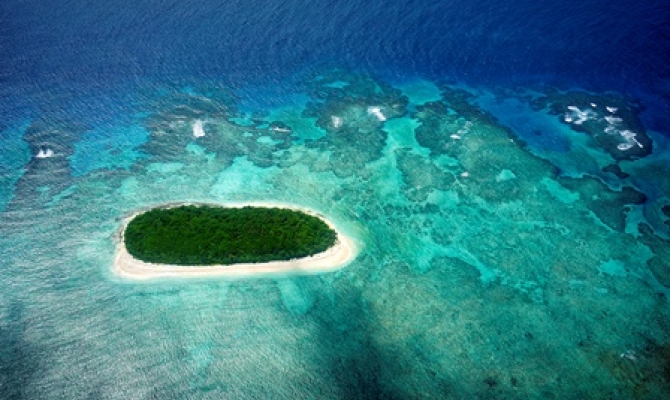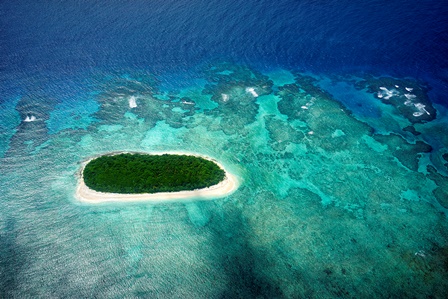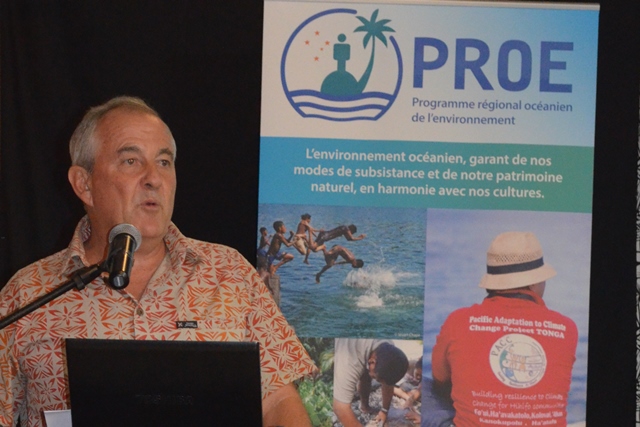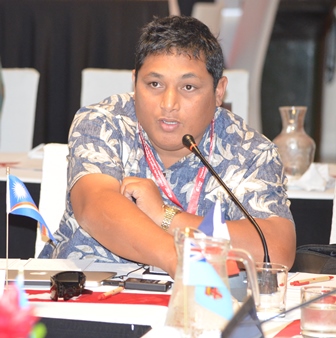
Biodiversity Conservation
The protection, management and development of the marine and coastal environment for the Pacific islands region, was at the core of discussions in Apia, Samoa, today with the opening of the 13th Conference of the Parties to the Noumea Convention.
Also known as the SPREP Convention, it entered into force along with its two Protocols on "Dumping" and "Emergencies" in 1990.
 Vava'u, Tonga © Stuart Chape
Vava'u, Tonga © Stuart Chape
In order to protect the Pacific islands environment, it is through the Noumea Convention that parties have agreed to take all appropriate measures to abide under international law to prevent, reduce and control pollution in the Convention Area from any source. Parties must also ensure sound environmental management and development of natural resources.
"The Pacific Ocean covers an area that is larger than the surface area of the moon. Our region is mostly ocean, comprising 2% land and 98% water. The Pacific Ocean is vast but it is also under threat from challenges such as ocean acidification, marine pollution and overfishing," said Mr. David Sheppard Director-General of the Secretariat of the Pacific Regional Environment Programme (SPREP).
"The threats to the Pacific Ocean are many and varied and action is needed, and it is needed now. The Secretariat and Convention Parties are all agreed that mechanisms such as the Pacific Oceanscape Framework are providing critical and effective guidance for the level of integrated actions we need across the region."
Australia, Cook Islands, Federated States of Micronesia, France, Marshall Islands, Nauru, New Zealand, Samoa, Solomon Islands and the United States are present at the gathering in Apia along with New Caledonia as an observer.

"I look forward to guidance from Parties today to ensure a dynamic and effective Noumea Convention which benefits the environment and people of the Pacific region. The Noumea Convention offers a very important legally binding mechanism for tackling the big issues that our countries face in the Pacific," said Mr. Sheppard.
In collaboration with the Secretariat of the Pacific Community and the Forum Fisheries Agency, SPREP is proposing to undertake a detailed analysis of the forms completed by observers on fishing vessels who witness interactions with threatened species such as turtles and marine mammals. This follows on from a recent detailed analysis undertaken by SPREP of observer forms detailing the dumping of marine debris from fishing vessels which revealed a considerable amount of valuable information.
The Conference of the Parties to the Noumea Convention will also propose to strengthen partnerships such as the International Maritime Organization (IMO) in terms of to encourage members to ratify the various IMO conventions. The "Dumping" and "Emergencies" Protocols of the Noumea Convention mirror those of the IMO.
"Let's all work together to ensure that The Convention is working as effectively as possible to support the better management and observation of our Pacific Ocean and its resources," said Mr. Sheppard.
A key funding partner for the Noumea Convention is the Government of the United States of America, whose significant financial support for activities under the Convention and was acknowledged by the Parties today.
There are 12 SPREP members that have ratified the Convention and Protocols, these being: Australia, Cook Islands Federated States of Micronesia, Fiji, France, Marshall Islands, Nauru, New Zealand, Papua New Guinea, Samoa, Solomon Islands and the United States.
 Mr. Warwick Harris of the Government of Marshall Islands at the Thirteenth Meeting of the Noumea Convention
Mr. Warwick Harris of the Government of Marshall Islands at the Thirteenth Meeting of the Noumea Convention
The 13th meeting of the Noumea Convention is held at the Tanoa Tusitala in Apia, Samoa. It will be followed by the 8th meeting of the Waigani Convention on 18 September. The Pacific Environment Forum on Climate Finance is on 21 September and the Twenty-Sixth SPREP Meeting of Officials is from 22nd – 24th September.
The 13 Parties to the Waigani Convention are Australia, Cook Islands, Federated States of Micronesia, Fiji, Kiribati, New Zealand, Niue, Papua New Guinea, Samoa, Solomon Islands, Tonga, Tuvalu and Vanuatu.
The 21 Pacific island countries and territories that are members of SPREP are: American Samoa, Commonwealth of the Northern Marianas, Cook Islands, Federated States of Micronesia, Fiji, French Polynesia, Guam, Kiribati, Marshall Islands, Nauru, New Caledonia, Niue, Palau, Papua New Guinea, Samoa, Solomon Islands, Tokelau, Tonga, Tuvalu, Vanuatu and Wallis and Futuna.
The 5 Metropolitan members of SPREP are: Australia, France, New Zealand, United Kingdom and the United States of America.
Also known as the SPREP Convention, it entered into force along with its two Protocols on "Dumping" and "Emergencies" in 1990.
 Vava'u, Tonga © Stuart Chape
Vava'u, Tonga © Stuart Chape"The Pacific Ocean covers an area that is larger than the surface area of the moon. Our region is mostly ocean, comprising 2% land and 98% water. The Pacific Ocean is vast but it is also under threat from challenges such as ocean acidification, marine pollution and overfishing," said Mr. David Sheppard Director-General of the Secretariat of the Pacific Regional Environment Programme (SPREP).
"The threats to the Pacific Ocean are many and varied and action is needed, and it is needed now. The Secretariat and Convention Parties are all agreed that mechanisms such as the Pacific Oceanscape Framework are providing critical and effective guidance for the level of integrated actions we need across the region."
Through the Noumea Convention, SPREP has been able to address many of the emerging and challenge issues in the Pacific ocean such as Deep Seabed Minerals exploration and mining; increased fishing pressures on fish stocks and species of iconic and cultural biodiversity significance; increasing marine pollution including marine debris related to fishing, shipping and land based sources; and ocean acidification and the declines in marine species and survival end ecosystem resilience.
Australia, Cook Islands, Federated States of Micronesia, France, Marshall Islands, Nauru, New Zealand, Samoa, Solomon Islands and the United States are present at the gathering in Apia along with New Caledonia as an observer.

Mr. David Sheppard, Director-General, SPREP
"I look forward to guidance from Parties today to ensure a dynamic and effective Noumea Convention which benefits the environment and people of the Pacific region. The Noumea Convention offers a very important legally binding mechanism for tackling the big issues that our countries face in the Pacific," said Mr. Sheppard.
In collaboration with the Secretariat of the Pacific Community and the Forum Fisheries Agency, SPREP is proposing to undertake a detailed analysis of the forms completed by observers on fishing vessels who witness interactions with threatened species such as turtles and marine mammals. This follows on from a recent detailed analysis undertaken by SPREP of observer forms detailing the dumping of marine debris from fishing vessels which revealed a considerable amount of valuable information.
The Conference of the Parties to the Noumea Convention will also propose to strengthen partnerships such as the International Maritime Organization (IMO) in terms of to encourage members to ratify the various IMO conventions. The "Dumping" and "Emergencies" Protocols of the Noumea Convention mirror those of the IMO.
"Let's all work together to ensure that The Convention is working as effectively as possible to support the better management and observation of our Pacific Ocean and its resources," said Mr. Sheppard.
A key funding partner for the Noumea Convention is the Government of the United States of America, whose significant financial support for activities under the Convention and was acknowledged by the Parties today.
There are 12 SPREP members that have ratified the Convention and Protocols, these being: Australia, Cook Islands Federated States of Micronesia, Fiji, France, Marshall Islands, Nauru, New Zealand, Papua New Guinea, Samoa, Solomon Islands and the United States.
 Mr. Warwick Harris of the Government of Marshall Islands at the Thirteenth Meeting of the Noumea Convention
Mr. Warwick Harris of the Government of Marshall Islands at the Thirteenth Meeting of the Noumea ConventionThe 13 Parties to the Waigani Convention are Australia, Cook Islands, Federated States of Micronesia, Fiji, Kiribati, New Zealand, Niue, Papua New Guinea, Samoa, Solomon Islands, Tonga, Tuvalu and Vanuatu.
The 21 Pacific island countries and territories that are members of SPREP are: American Samoa, Commonwealth of the Northern Marianas, Cook Islands, Federated States of Micronesia, Fiji, French Polynesia, Guam, Kiribati, Marshall Islands, Nauru, New Caledonia, Niue, Palau, Papua New Guinea, Samoa, Solomon Islands, Tokelau, Tonga, Tuvalu, Vanuatu and Wallis and Futuna.
The 5 Metropolitan members of SPREP are: Australia, France, New Zealand, United Kingdom and the United States of America.